Our visit to Jaipur, India

by Amy
Posted on Friday, April 21st, 2006 at 9:50 am CET
We spent four days in Jaipur, Rajasthan, India in March 2006. Our visit coincided with the annual Elephant Festival on 13 March and the holiday Holi on 14 March. We also had a chance to visit some of the sights of the city, including the Hawa Mahal, Jantar Mantar, City Palace, and more.
Jaipur, the capital of Rajasthan, is a large city with a population approaching 3 million. The city was founded in 1728 by Maharaja Sawai Jai Singh and, unusual for an old Indian town, is laid out in a grid pattern with six sections separated by broad avenues. Many of the buildings are made from red sandstone. The Hawa Mahal, Jantar Mantar and City Palace are all located in the oldest part of town, known as the Pink City.
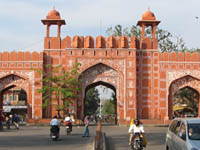
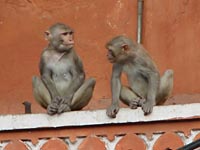
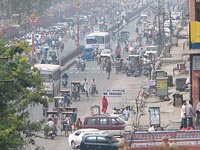
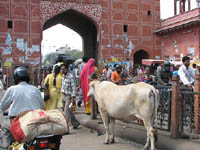
The most famous building in Jaipur, the Hawa Mahal, is a fanciful latticed concoction of red sandstone. Also known as the Palace of the Winds, it was built to allow ladies of the royal family to observe the goings-on in Jaipur while still maintaining purdah.
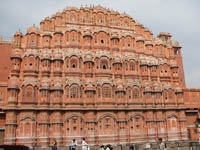
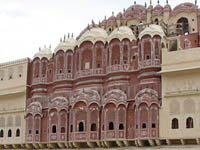
This observatory, built by Maharaja Jai Singh II beginning in 1727, is located just across from the City Palace. There are fourteen major instruments, designed for instance to measure time or calculate the positions of celestial bodies. The impressive collection includes the world’s largest sundial.
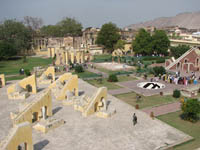
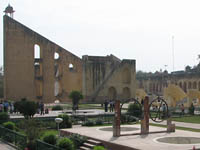

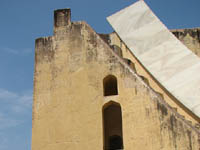
We also went to the City Palace where we visited the museums inside, including the Maharaja Sawai Mansingh II Museum, housing royal clothing, and the Carriage Museum. Some musicians were practicing in a courtyard for the next day’s Elephant Festival activities. We could not take any photos inside the museums, which was too bad. The palace is still home to the maharajah of Jaipur, and part of the complex is not accessible for visitors. When we were there, one private courtyard was being prepared for a lunch. The last part of the palace we visited was an artists’ workshop, where we could see several craftsmen and their artwork. One miniature painter gave us a short demonstration and showed us a lot of his work. We bought a couple of his paintings; one camel and one elephant.
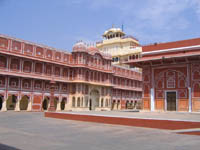
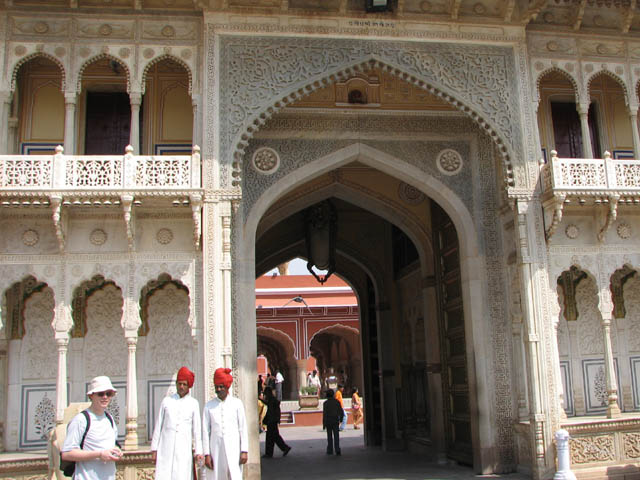
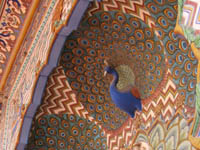
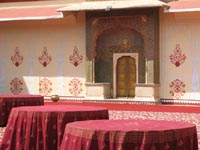
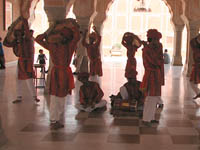
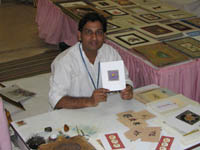
Temples: Surya Mandir and Galta
Since these temples are located a bit outside the city center, we hired a rickshaw to bring us to Surya Mandir (Temple of the Sun God) and Galta (Monkey Temple). We had to walk up a hill to get to them, and passed dozens of monkeys, cows, pigs and dogs on the way. From Surya Mandir we had a great view over Jaipur. The huge city really sprawls. At the sun temple we made an offering and I got a good luck orange dot on my forehead.
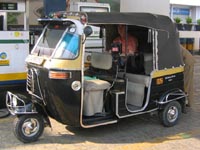
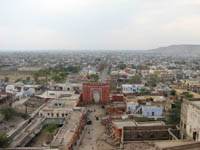
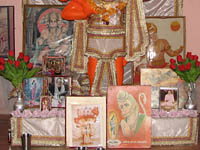
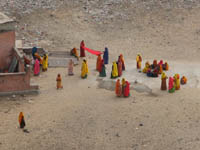
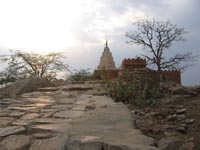
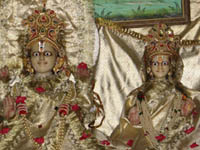
Back down by the rickshaw we bought bags of dried chickpeas and peanuts to feed the monkeys. We walked back up and I sat down on the brick road border to feed some monkeys. Before I knew it, the bag of peanuts was stolen by a cheeky monkey. Arthur was busy taking photos and caught the culprit on film milliseconds before the theft. Later the bag of chickpeas was also snatched but when the thief monkey wasn’t paying attention I snatched it back, much to the monkey’s great surprise, and I daresay, chagrin. Feeding the monkeys was great fun but some bigger ones snarfed the food right from my hand which was a bit alarming. Some of the smaller ones were a bit grabby too, which was also a little scary. Once I thought I got a scratch but it was a false alarm.
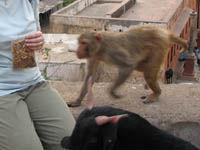
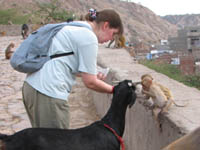
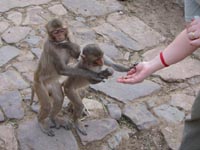
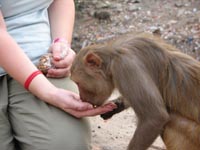
We went to the Raj Mandir cinema to see a late showing of Malamaal Weekly. The theater was opulent but not overly impressive, kind of like a big creamy wedding cake. Unfortunately we could not take photos inside. The house was packed. We spotted two other parties of non-Indians in the crowd. The audience very enthusiastically enjoyed the broad comedy, hooting when a popular actor made his first appearance or oohing and aahing during silly love scenes and guffawing during the impossibly silly chase scene at the end. Some parts of the Hindi movie were difficult to understand but overall we got the idea of the story. A resident of a small village wins a large lottery jackpot but dies of shock, and the lottery-ticket seller tries to keep the jackpot for himself. Other people start getting involved through a series of hilariously unfortunate mishaps and before long the whole town is after the money.
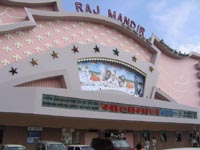
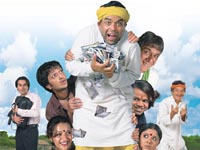
We spent four days in Jaipur, Rajasthan, India in March 2006. Our visit coincided with the annual Elephant Festival on 13 March and the holiday Holi on 14 March. We also had a chance to visit some of the sights of the city, including the Hawa Mahal, Jantar Mantar, City Palace, and more.
Jaipur, the capital of Rajasthan, is a large city with a population approaching 3 million. The city was founded in 1728 by Maharaja Sawai Jai Singh and, unusual for an old Indian town, is laid out in a grid pattern with six sections separated by broad avenues. Many of the buildings are made from red sandstone. The Hawa Mahal, Jantar Mantar and City Palace are all located in the oldest part of town, known as the Pink City.
 |
 |
 |
 |
The most famous building in Jaipur, the Hawa Mahal, is a fanciful latticed concoction of red sandstone. Also known as the Palace of the Winds, it was built to allow ladies of the royal family to observe the goings-on in Jaipur while still maintaining purdah.
 |
 |
This observatory, built by Maharaja Jai Singh II beginning in 1727, is located just across from the City Palace. There are fourteen major instruments, designed for instance to measure time or calculate the positions of celestial bodies. The impressive collection includes the world’s largest sundial.
 |
 |
 |
 |
We also went to the City Palace where we visited the museums inside, including the Maharaja Sawai Mansingh II Museum, housing royal clothing, and the Carriage Museum. Some musicians were practicing in a courtyard for the next day’s Elephant Festival activities. We could not take any photos inside the museums, which was too bad. The palace is still home to the maharajah of Jaipur, and part of the complex is not accessible for visitors. When we were there, one private courtyard was being prepared for a lunch. The last part of the palace we visited was an artists’ workshop, where we could see several craftsmen and their artwork. One miniature painter gave us a short demonstration and showed us a lot of his work. We bought a couple of his paintings; one camel and one elephant.
 |
 |
 |
 |
 |
 |
Temples: Surya Mandir and Galta
Since these temples are located a bit outside the city center, we hired a rickshaw to bring us to Surya Mandir (Temple of the Sun God) and Galta (Monkey Temple). We had to walk up a hill to get to them, and passed dozens of monkeys, cows, pigs and dogs on the way. From Surya Mandir we had a great view over Jaipur. The huge city really sprawls. At the sun temple we made an offering and I got a good luck orange dot on my forehead.
 |
 |
 |
 |
 |
 |
Back down by the rickshaw we bought bags of dried chickpeas and peanuts to feed the monkeys. We walked back up and I sat down on the brick road border to feed some monkeys. Before I knew it, the bag of peanuts was stolen by a cheeky monkey. Arthur was busy taking photos and caught the culprit on film milliseconds before the theft. Later the bag of chickpeas was also snatched but when the thief monkey wasn’t paying attention I snatched it back, much to the monkey’s great surprise, and I daresay, chagrin. Feeding the monkeys was great fun but some bigger ones snarfed the food right from my hand which was a bit alarming. Some of the smaller ones were a bit grabby too, which was also a little scary. Once I thought I got a scratch but it was a false alarm.
 |
 |
 |
 |
We went to the Raj Mandir cinema to see a late showing of Malamaal Weekly. The theater was opulent but not overly impressive, kind of like a big creamy wedding cake. Unfortunately we could not take photos inside. The house was packed. We spotted two other parties of non-Indians in the crowd. The audience very enthusiastically enjoyed the broad comedy, hooting when a popular actor made his first appearance or oohing and aahing during silly love scenes and guffawing during the impossibly silly chase scene at the end. Some parts of the Hindi movie were difficult to understand but overall we got the idea of the story. A resident of a small village wins a large lottery jackpot but dies of shock, and the lottery-ticket seller tries to keep the jackpot for himself. Other people start getting involved through a series of hilariously unfortunate mishaps and before long the whole town is after the money.
 |
 |


4:09 pm
Hi Amy
Its great to see your post…I am also from jaipur and you defined jaipur pretty well…it seems that you observed many things in jaipur…
so are you planning to visit Jaipur again?